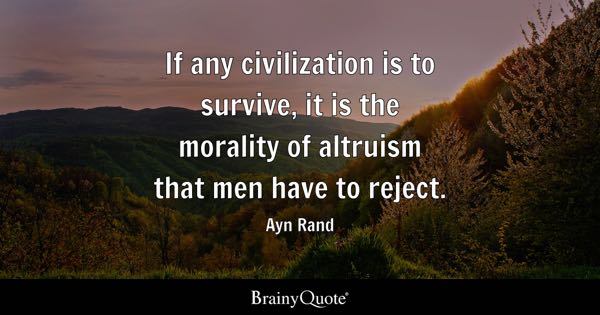There are two moving parts going on with the OP.
The first part asks questions about evolution explaining the development of altruism in the human species... "Whence comes human altruism?"
The second part concerns the question: "Is the moral of altruism good or bad for the survival of our society?"
Those are two different questions. After all, evolution gave us violent and biased dispositions as well as altruism. The former two have shown to negatively impact most societies, at least when they appear in large amounts.
I concur that most-- but maybe not all-- of our innate altruistic tendencies are with us solely because of evolution. At the very least, evolution got the ball rolling, and society took it from there. I don't think all altruism, as it appears in life and society today, is reducible to raw evolutionary development... but most of it is.
I also disagree with Rand that "more altruism" will lead to a failing of our society. Why? Well it isn't because Rand is a horrendous troll with a bunch of bad ideas. As true as that is-- and, yes, Rand is a rather foul creature-- it's ad hominem reasoning to dismiss her argument on that count. Rand is incorrect because her claim is false. Not because she is a soulless human being.
If Rand has any point, it's that altruism may outlive its usefulness at some point. Do I think we're anywhere close to that point in present society? No.
But I suppose I'd agree with her that there is somewhere on the spectrum that selfishness and greed may fulfil roles in society that "more and more altruism" cannot. I'd also agree that selfishness isn't "all bad," adding the caveat that I don't see nearly so much good in selfishness as Rand did.
So I think the more interesting question is, "What balance of altruism and selfishness is best for our society?" Any takers on that one?
Good points.
Pretty much our entire psychological compliment is tailored to facilitate the lifestyle that created it, over millions of years. Human psychology is designed for life in small, mobile bands of foragers. When your whole society consists of a family of one or two dozen cave-mates, misbehavior is easily deterred, and coöperation optimized. Translate this mindset to horticultural, pastoral, agricultural, industrial, and post-industrial societies, and the fit becomes more and more problematic.
Our nature as social animals, altruism, if you will, has led to the regulated social systems we have today. Some are authoritarian and predatory, geared more to maintaining the power élite than the welfare of the common citizens. Citizens are left to fend for themselves, to sink or swim. These resemble the objectivist socies Rand advocates, in many respects.
Others are more socialist, with a social safety net and programs designed to p. promote the welfare of the citizens. These are like the social democracies of some western European nations.
Personally, I'd choose to live in the latter.

